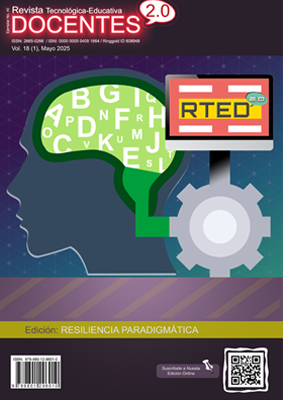Reflective Professional Practice in University Literary Education
 DOI:
https://doi.org/10.37843/rted.v18i1.594
DOI:
https://doi.org/10.37843/rted.v18i1.594
Main Article Content
Abstract
Reflective professional practice in teaching university literature is an approach that goes beyond the simple transmission of knowledge, promoting a critical and collaborative dialogue between students and teachers, using a selection of literary texts as a basis. The aim was to foster a deep understanding and active analysis of literary texts, helping students improve their linguistic and writing skills and develop their emotional intelligence and creativity. The research used the hermeneutic method, constructivist paradigm, qualitative approach, and interpretive and cross-sectional grounded theory design. The population under study comprised 15 first-year students with a bachelor’s degree in English studies. Through reflective analysis and tools such as writing journals, students deepened their understanding of literary texts, recorded their emotions, and reflected on the impact of the text and their personal and cultural context. This process brought together the cognitive, the emotional, and the creative, improving literary appreciation and self-knowledge. Consequently, the practice contributed significantly to the comprehensive development of students, promoting a critical and conscious understanding of literary texts and a greater appreciation of the transformative power of literature in their lives, which aligns with meaningful learning.
Downloads
Metrics
Article Details

This work is licensed under a Creative Commons Attribution-NonCommercial-NoDerivatives 4.0 International License.
Those authors who have publications in our journal accept the following terms:
- When a work is accepted for publication, the author retains rights of reproduction, distribution of his/her article for exploitation in all countries of the world in the format provided by our magazine and any other magnetic medium, optical, and digital.
- Authors will retain their copyright and guarantee the journal the right first to publish their work, which will be simultaneously subject to the Creative Commons Acknowledgment License (Attribution-NonCommercial-NoDerivatives 4.0 International (CC BY-NC-ND 4.0)). That allows third parties to copy and redistribute the material in any medium or format, under the following conditions: Acknowledgment - You must properly acknowledge authorship, provide a link to the license, and indicate if any changes have been made. You may do so in any reasonable way, but not in a way that suggests you have the licensor's endorsement or receive it for your use. NonCommercial - You may not use the material for a commercial purpose. NoDerivatives - If you remix, transform, or build from the material, you cannot broadcast the modified material. There are no additional restrictions - You cannot apply legal terms or technological measures that legally restrict you from doing what the license allows.
- Authors may adopt other non-exclusive license agreements to distribute the published version of the work (e.g., deposit it in an institutional archive or publish it in a monographic volume) provided that the initial publication in this journal is indicated.
- Authors are allowed and recommended to disseminate their work through the Internet (e.g., in institutional telematic archives, repositories, libraries, or their website), producing exciting exchanges and increasing the published work's citations.
- Request of withdrawal an article has to be done in writing by the author to the Editor, becoming effective after a written response from the Editor. For this purpose, the author or authors will send correspondence via e-mail: [email protected].
- The author will not receive financial compensation for the publication of his work.
- All Docentes 2.0 Journal publications are under the Open Journal System (OJS) platform at: https://ojs.docentes20.com/.
References
Bogdan, D. (2007). Re-educating the imagination: Toward a poetics, politics, and pedagogy of literary engagement. Boynton/Cook Publishers.
Brozo, W.G., & Simpson, M. L. (2007). Content literacy for today’s adolescents: Honoring diversity and building competence (5th ed.). Upper Saddle River, NJ: Merrill/Prentice Hall.
Bruffee, K. A. (1993). Collaborative Learning: Higher education, interdependence, and the authority of knowledge. Johns Hopkins University Press.
Delci, E. L., & Ryan, R.M. (1985). Intrinsic motivation and self-determination in human behavior. Plenum. DOI: https://doi.org/10.1007/978-1-4899-2271-7
Dewey, J. (2000). Experiencia y educación. Biblioteca nueva.
Gadamer, H. G. (2011). Ética y hermenéutica. Tecnos.
Piaget, J. (2003). La psicología de la inteligencia. Siglo XXI.
Mainer, J. C. (2000). Historia, literatura, sociedad (y una coda española). Biblioteca Nueva.
Moriña, A. (2017). Investigar con historias de vida. Metodología biográfico-narrativa. Narcea.
Sadler, D. R. (1989). Formative assessment and the design of instructional systems. Instructional Science, 18(2), 119-144. DOI: https://doi.org/10.1007/BF00117714
Sainz, J.M. (2017). El plan estratégico en la práctica. ESIC.
Schön, D. (2002). La formación de profesionales reflexivos. Hacia un nuevo diseño de la enseñanza y el aprendizaje. Paidós.
Schön, D. (1998). El profesional reflexivo. Cómo piensan los profesionales cuando actúan. Paidós.
Short, K., Haste, J.C., & Burke, C. (1996). Creating Classrooms for Authors and Inquirers. Heinemann.
Strauss, A. L. (1990). Qualitative Analysis for Social Scientists. New York: Cambridge University Press.
Vygotsky. L. (2020). Lenguaje y pensamiento. Paidós.






